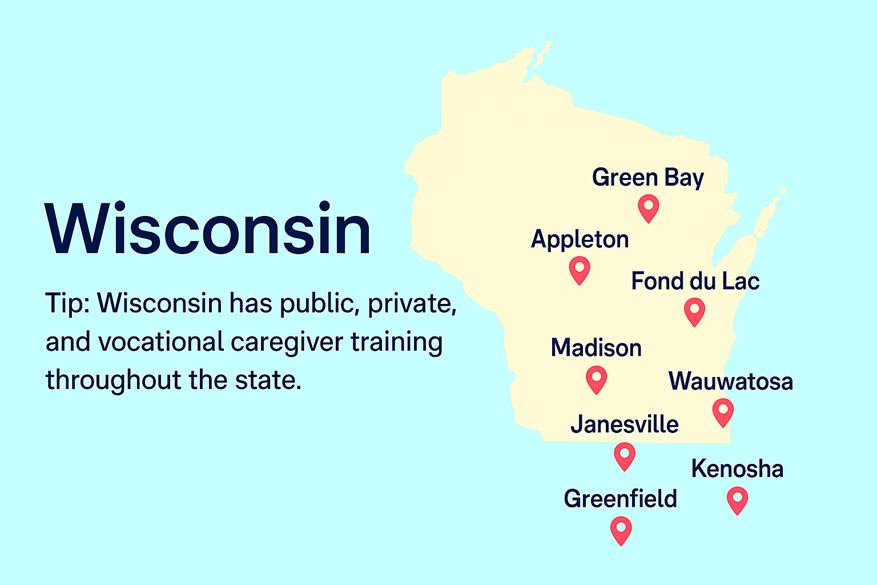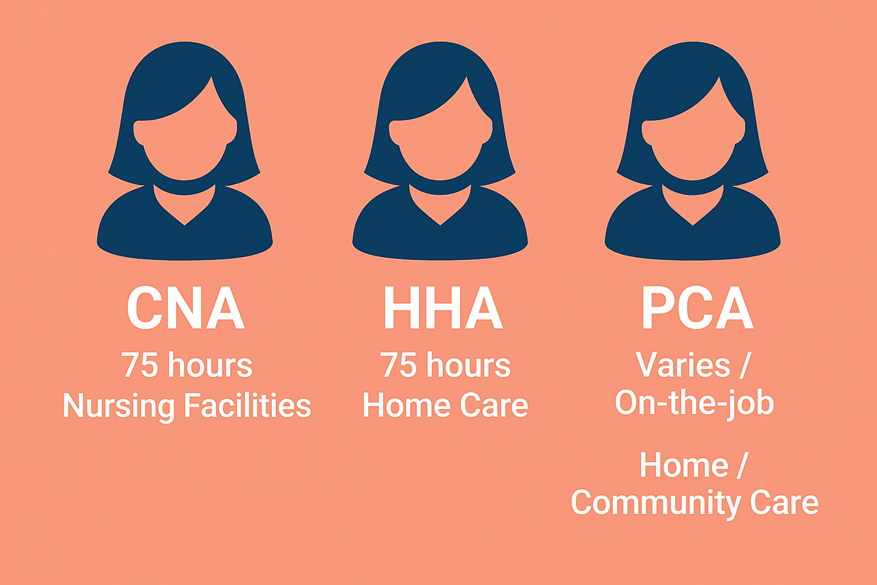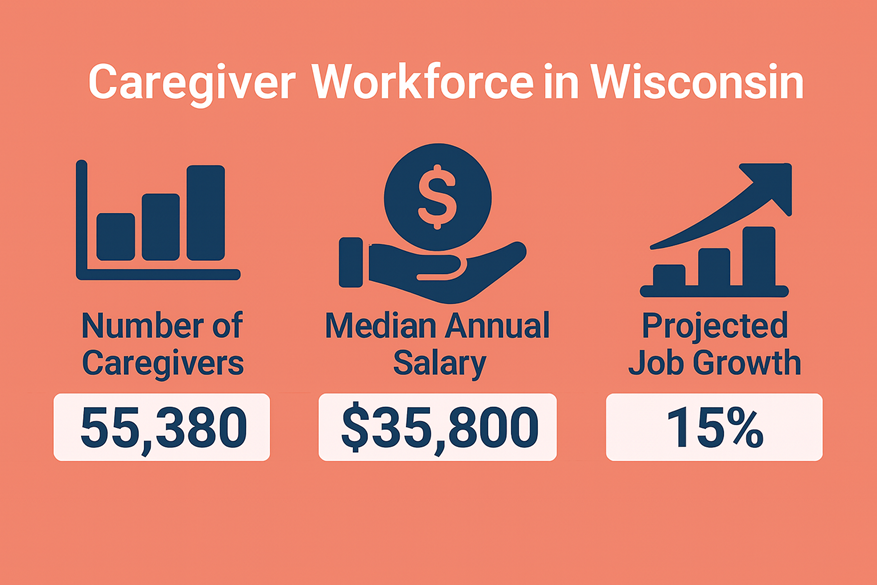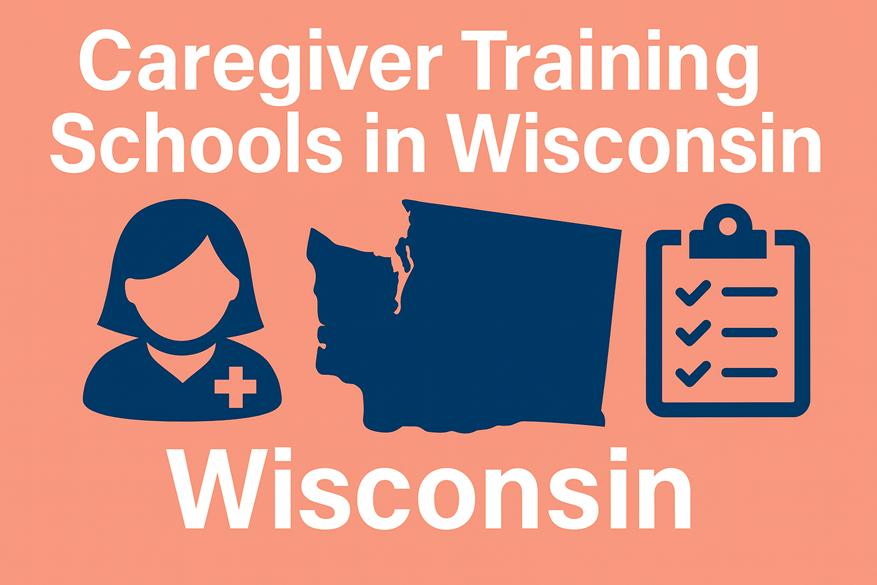If you’re thinking about becoming a caregiver in Wisconsin, you’re in the right place. Whether you’re looking to become a Certified Nursing Assistant (CNA) or a Home Health Aide (HHA), there’s a growing need for compassionate people like you across the state. From local colleges to hands-on vocational schools, Wisconsin has plenty of training options to get you started. And don’t worry—you don’t need years of schooling. Many programs can be completed in just a few weeks.
This guide will walk you through the training options, local schools, certification steps, job outlook, and everything else you need to make an informed start in your caregiving journey.
Training Paths in Wisconsin

There are two main ways to get certified as a CNA or HHA in Wisconsin:
Public & Private Colleges in Wisconsin
Community and technical colleges are a reliable route for CNA training. These programs are usually short-term (4 to 12 weeks), affordable, and offer flexible schedules. Many colleges partner with local clinics or nursing homes for clinical experience. Some private colleges and health-focused universities also offer similar certificate programs.
Popular cities like Madison, Green Bay, and Milwaukee have a number of colleges with accredited CNA programs. Some may even offer job placement support after you graduate.
Vocational & Career Schools in Wisconsin
Vocational schools are another great option—especially if you want a hands-on, no-fluff approach. These schools often cater to adult learners, offer evening or weekend classes, and sometimes even fast-track certifications. Many vocational schools across Wisconsin offer CNA training, and a few offer HHA programs as part of a combined curriculum.
Cities like Kenosha, Wausau, and Appleton have accessible career schools and training centers, often with small class sizes and personal instruction.
Public & Private Colleges with CNA/HHA Programs
Vocational & Career Schools with Caregiver Training
CNA vs HHA in Wisconsin: What’s the Difference?

While both CNAs and HHAs work in caregiving roles, their job duties, training requirements, and work settings differ slightly—especially in Wisconsin.
Certified Nursing Assistants (CNAs)
In Wisconsin, CNAs must complete a state-approved training program of at least 75 hours, including both classroom instruction and hands-on clinical training. After finishing the course, you must pass a written and skills exam through the Wisconsin Nurse Aide Registry (administered by Headmaster).
CNAs often work in hospitals, skilled nursing facilities, and assisted living centers. They assist patients with daily living tasks such as bathing, feeding, and mobility. CNAs are more likely to handle medical-related tasks compared to HHAs.
Home Health Aides (HHAs)
Wisconsin does not have a standalone certification for HHAs. Instead, most HHAs are trained under a CNA-approved curriculum with additional instruction tailored for home care. Many agencies hire CNAs for home health roles and then provide supplemental training focused on home-based support.
HHAs usually work in private homes, helping elderly or disabled clients with household chores, personal hygiene, medication reminders, and companionship.
In short, if you’re aiming to work in a home setting, you might still need to complete CNA training first in Wisconsin.
CNA/HHA Job Outlook and Salary in Wisconsin (as of August 2025)

The caregiving field continues to grow in Wisconsin. With an aging population and increasing demand for long-term care, CNAs and HHAs are needed in nearly every region.
According to the U.S. Bureau of Labor Statistics and recent state workforce data:
- Average CNA salary in Wisconsin: $35,800 per year (around $17.20/hour)
- Top 10% of CNAs in Wisconsin: Over $42,000 annually
- Average HHA salary in Wisconsin: $31,000–$34,000 per year
- Job openings statewide: Over 7,000 new caregiving jobs expected by 2026
- Highest-demand areas: Milwaukee, Madison, Green Bay, Kenosha, and rural counties with limited caregiver access
Facilities like nursing homes, home care agencies, and hospitals continue to hire year-round. Many even offer hiring bonuses or tuition reimbursement for certified caregivers.
CNA and HHA Licensing & Certification Steps in Wisconsin
Here’s how to get certified as a caregiver in Wisconsin:
For CNAs:
- Complete a State-Approved CNA Program
The course must meet the 75-hour minimum (including 16 hours of clinicals). - Register for the Wisconsin CNA Competency Exam
This exam is administered by Headmaster D & S. You must pass both a written (or oral) and a skills-based test. - Get Listed on the Wisconsin Nurse Aide Registry
After passing your exam, your name will be added to the state registry. Employers can then verify your certification online. - Maintain Your Certification
To stay active, you must work at least 8 hours as a paid CNA in a licensed facility every 24 months.
For HHAs:
- Start by completing CNA training.
- Find an agency that offers additional home health-specific instruction.
- No separate HHA registry exists in Wisconsin, but most employers prefer CNA certification with home care experience.
What About PCAs in Wisconsin?
Personal Care Assistants (PCAs) provide basic, non-medical care to people with disabilities, chronic illnesses, or age-related needs. Their duties often include:
- Helping with bathing, dressing, and grooming
- Preparing simple meals
- Doing light housekeeping
- Providing companionship
- Assisting with mobility or errands
PCAs typically work in clients’ homes or in community-based care settings, often under the direction of a family member or through a state-funded program.
Is PCA a Certified Role in Wisconsin?
No, Wisconsin does not require PCAs to be certified or licensed through the state. That means:
- There is no official registry or licensing exam for PCAs
- Training is usually provided on the job or through employer-based programs
- Some employers prefer or require CPR certification or basic caregiver training
- Agencies receiving Medicaid funding may have specific training requirements (often similar to HHA training)
Where Can You Train to Be a PCA in Wisconsin?
Some community programs, nonprofits, and private training centers offer short-term PCA or Direct Care Worker courses. These programs typically last 1 to 3 weeks and focus on basic caregiving skills, safety, communication, and support strategies.
Examples:
- Community-based organizations offering caregiver training
- Home care agencies that train PCAs internally
- Workforce development boards that fund training through state grants or employment programs
Although PCA roles don’t require formal certification, completing a short caregiver course (or CNA program) can increase your chances of getting hired.
Should You Become a PCA First?
Many people in Wisconsin start as PCAs to gain experience in caregiving. It’s a good stepping stone to becoming a CNA or HHA later on. If you’re unsure about jumping straight into certification, PCA roles let you test the waters and learn on the job—often with flexible hours.
Caregiver Role Summary
| Role | Certification Required? | Typical Work Setting | Training Path |
|---|---|---|---|
| CNA | Yes (state-certified) | Hospitals, nursing homes, some home care | 75+ hour course + state exam |
| HHA | No separate cert; often CNA + agency training | Home care | CNA + home care modules |
| PCA | No formal certification | Home care, assisted living, self-directed care | On-the-job or short course |
Your Caregiver Journey Starts Here
Becoming a CNA or HHA in Wisconsin doesn’t require years of school—just a few weeks of solid training and a real desire to help others. Whether you prefer a college setting or a career-focused training center, there’s a program that fits your life. With caregiving jobs growing fast and offering meaningful, steady work, now is a great time to take that first step.
Pick a school, start your training, and get ready to make a real difference in someone’s life. You’ve got this.
Disclaimer
The information in this guide reflects data available as of August 2025. Certification rules, program costs, and job availability may change. Always confirm with the Wisconsin Department of Health Services, individual schools, or training providers before making any decisions.
Sources
- Wisconsin Department of Health Services – CNA Training and Registry
https://www.dhs.wisconsin.gov/caregiver/nurse-aide/index.htm - Headmaster D & S – Wisconsin CNA Exam Registration
https://www.hdmaster.com/testing/cnatesting/wisconsin/WI_CNA_Home.htm - U.S. Bureau of Labor Statistics – Nursing Assistants in Wisconsin
https://www.bls.gov/oes/current/oes311131.htm - Vision Healthcare Training Institute
https://www.visionhealthcareinstitute.com - Madison College CNA Program
https://madisoncollege.edu - Quality CNA Training
https://www.qualitycnatraining.com

